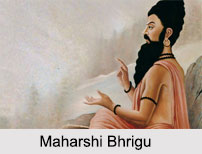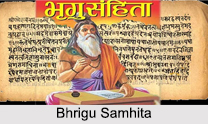 Maharishi Bhrigu was one of the seven great sages, the "Saptarshis" and also one of the Prajapatis created by Lord Brahma. Bhrigu established the ritual of offering the juice of the `Soma` plant to the old deities and took a great responsibility in composing Atharva-Veda. He was the author of astrological (Jyotish) classic "Bhrigu Samhita". He was married to Khyati, the daughter of King Daksha. The descendants of sage Bhrigu are called "Bhrigus" and thought to be above ground storm Gods who maintain the connection between earth and heaven.
Maharishi Bhrigu was one of the seven great sages, the "Saptarshis" and also one of the Prajapatis created by Lord Brahma. Bhrigu established the ritual of offering the juice of the `Soma` plant to the old deities and took a great responsibility in composing Atharva-Veda. He was the author of astrological (Jyotish) classic "Bhrigu Samhita". He was married to Khyati, the daughter of King Daksha. The descendants of sage Bhrigu are called "Bhrigus" and thought to be above ground storm Gods who maintain the connection between earth and heaven.
Myths of Bhrigu
 According to myths, Lord Brahma wished a son to assist him in the process of creation and Bhrigu`s birth took place. According to some legends Laxmi, the consort of Lord Vishnu is also sage Bhrigu`s daughter. Bhrigu`s another son Shukra is more famous than his father. In some traditions, sage Chyavana is also mentioned as Bhrigu`s son. There is a popular legend related to Bhrigu. Once he participated in a debate concerning who among the trinity god Brahma, Vishnu and Maheshwara was the greatest. Bhrigu first visited Brahma and Shiva and informed them about his quest. Both the Gods tried to impress him with their power. Then the sage visited Vaikuntha, the abode of Lord Vishnu. Lord Vishnu was asleep then. Bhrigu called him many times but the Lord did not wake up. The sage was so angry that he kicked the God on his chest. This made Vishnu to wake up. Immediately Lord Vishnu started pressing Bhrigu`s feet asking him if he had hurt his feet by kicking his hard chest. In this way Vishnu destroyed the third eye that was present on Bhrigu`s foot. When Bhrigu saw the humility of the God, he got the answer he was in quest for.
According to myths, Lord Brahma wished a son to assist him in the process of creation and Bhrigu`s birth took place. According to some legends Laxmi, the consort of Lord Vishnu is also sage Bhrigu`s daughter. Bhrigu`s another son Shukra is more famous than his father. In some traditions, sage Chyavana is also mentioned as Bhrigu`s son. There is a popular legend related to Bhrigu. Once he participated in a debate concerning who among the trinity god Brahma, Vishnu and Maheshwara was the greatest. Bhrigu first visited Brahma and Shiva and informed them about his quest. Both the Gods tried to impress him with their power. Then the sage visited Vaikuntha, the abode of Lord Vishnu. Lord Vishnu was asleep then. Bhrigu called him many times but the Lord did not wake up. The sage was so angry that he kicked the God on his chest. This made Vishnu to wake up. Immediately Lord Vishnu started pressing Bhrigu`s feet asking him if he had hurt his feet by kicking his hard chest. In this way Vishnu destroyed the third eye that was present on Bhrigu`s foot. When Bhrigu saw the humility of the God, he got the answer he was in quest for.
After the event of testing of trinity, Bhrigu decided to write his famous book of astrology, the "Bhrigu Samhita", to help Brahmins earn their living. Bhrigu collected the birth charts, wrote full-life forecasts and collected them together as "Bhrigu Samhita". This treatise is believed to contain over five million horoscopes, in which Bhrigu wrote down the fate of all the human beings in the universe. As popular tradition says, only about a hundredth of these horoscopes have survived to the modern era.









